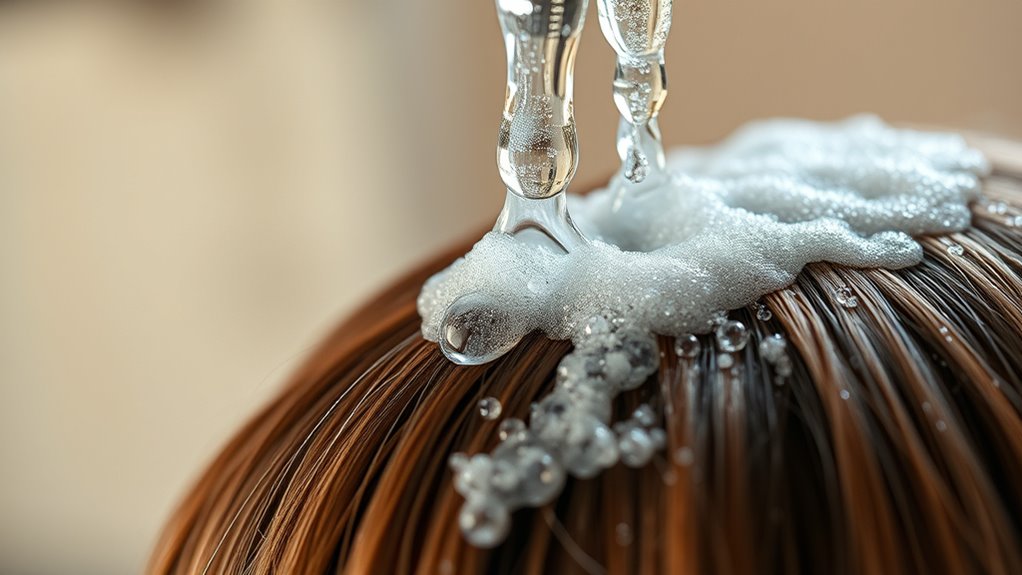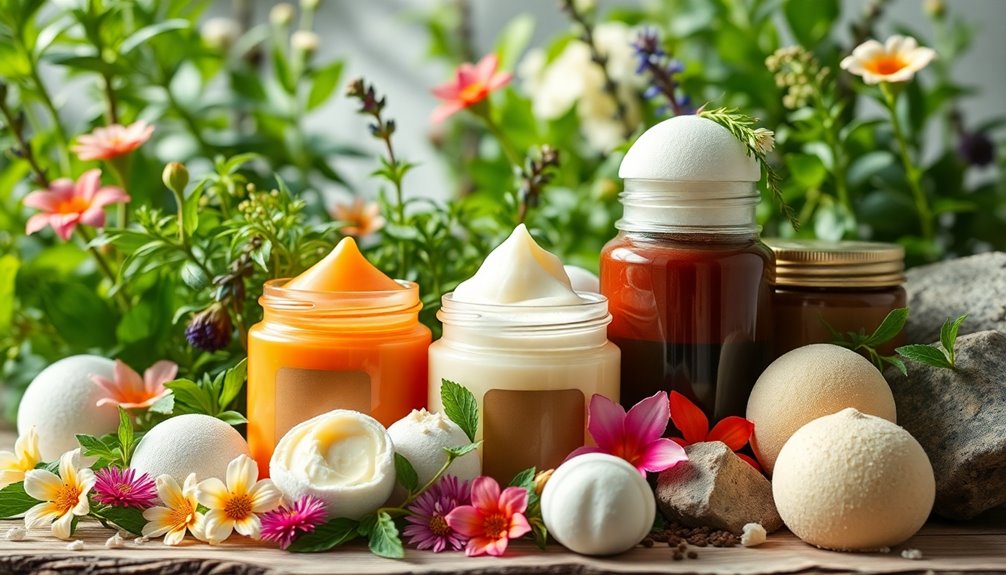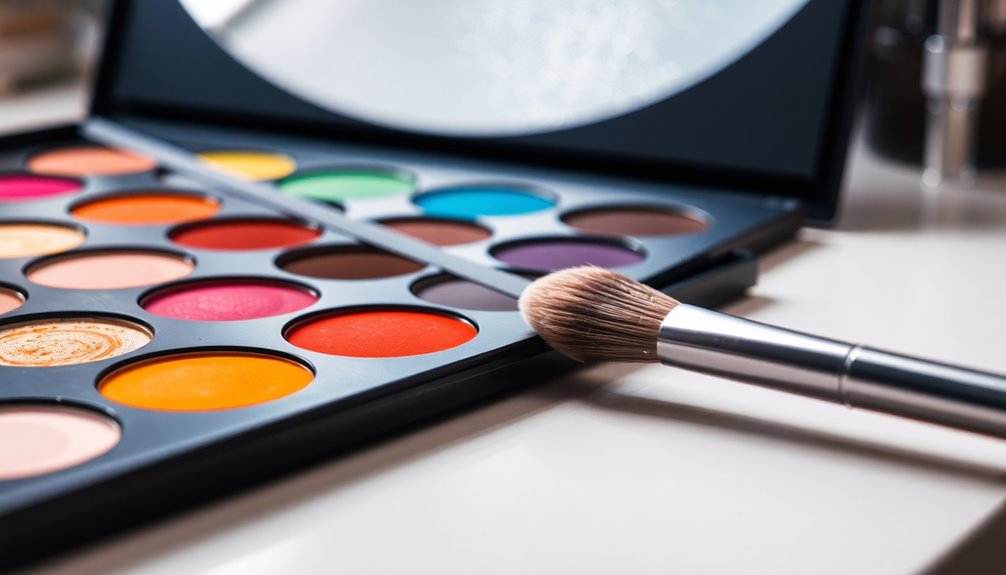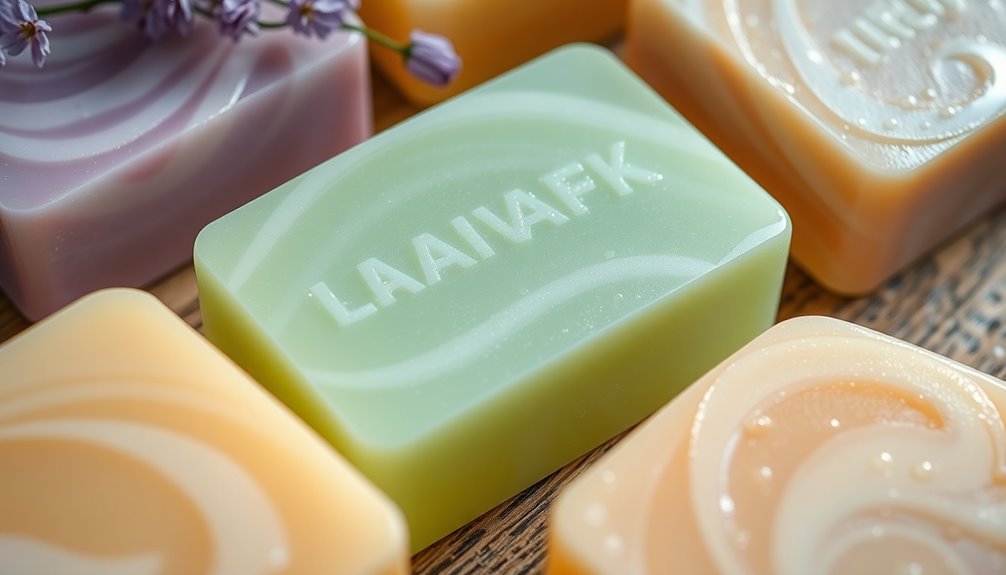Your shampoo does more than clean; it influences your scalp’s microbiome and how well your hair retains moisture. It affects the balance of bacteria and fungi, which keeps your scalp healthy and prevents issues like dandruff. The ingredients and pH level determine whether your hair’s cuticles open for better absorption or stay closed, impacting moisture and damage. Understanding this science can help you choose products that support your hair’s natural health—keep going to discover how.
Key Takeaways
- Shampoo impacts both internal hair health and the scalp microbiome, influencing overall hair resilience and appearance.
- Proper pH levels in shampoo help seal the cuticle and maintain microbial balance on the scalp.
- Tailoring shampoo to hair porosity prevents overload or undernourishment of hair strands.
- Ingredients like prebiotics and probiotics in shampoo support a healthy scalp microbiome.
- Scientific understanding of hair structure and scalp health guides effective shampoo formulations for optimal results.
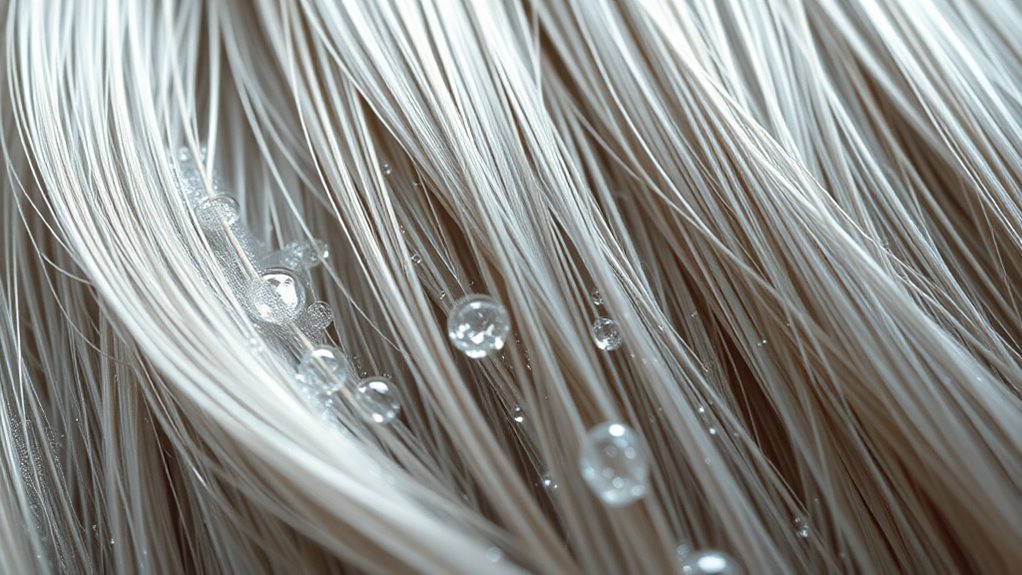
Understanding your hair’s porosity and maintaining a balanced scalp microbiome are essential for healthy hair. High porosity hair, which has open cuticles, absorbs moisture quickly but also loses it just as fast, making lightweight, hydrating shampoos ideal. Low porosity hair, with tightly closed cuticles, resists moisture and product penetration, so gentle, clarifying shampoos help open the cuticle for better absorption. Knowing your hair’s porosity helps you select the right shampoo and conditioning regimen, ensuring your hair receives the moisture and nutrients it needs without overloading or undersupplying. For example, if you have high porosity hair, you might benefit from lighter, hydrating shampoos that don’t weigh your strands down, followed by deep-conditioning treatments. Conversely, low porosity hair requires gentle, clarifying shampoos to open the cuticle and allow moisture to penetrate.
Equally important is understanding your scalp microbiome — the community of bacteria, fungi, and other microorganisms living on your scalp. A balanced scalp microbiome promotes healthy hair growth and prevents issues like dandruff, itchiness, and scalp inflammation. When your scalp’s microbiome is disrupted, whether by harsh shampoos, product buildup, or environmental stressors, it can lead to an imbalance, causing irritation and weakening hair roots. That’s why selecting shampoos with gentle, scalp-friendly ingredients is crucial. These products help maintain or restore your scalp’s natural microbial balance, supporting a healthy foundation for your hair. Incorporating scalp-specific treatments or using shampoos with prebiotics and probiotics can also nurture this delicate ecosystem. Additionally, choosing shampoos with pH levels close to your scalp’s natural acidity helps keep the cuticle closed and prevent microbial imbalances.
Your shampoo’s role extends beyond cleansing; it influences both your hair’s internal health and the health of your scalp microbiome. A well-formulated shampoo respects your hair’s porosity and supports the scalp’s microbial balance. For instance, shampoos with pH levels close to your scalp’s natural acidity help keep the cuticle closed and prevent microbial imbalances, reducing irritation. Understanding these scientific factors empowers you to choose products that work with your hair’s unique structure and scalp health rather than against it. When you pay attention to your hair porosity and scalp microbiome, you’re taking proactive steps to ensure your hair stays resilient, shiny, and healthy over time. Recognizing the importance of scalp microbiome health can lead to better product choices and overall scalp wellness.
Frequently Asked Questions
How Often Should I Change My Shampoo for Optimal Hair Health?
You might wonder how often to change your shampoo for ideal hair health. Usually, a frequency adjustment is needed based on your hair type and scalp condition. Consider rotating products every few months to prevent buildup and adapt to seasonal changes. Pay attention to how your hair responds, and don’t hesitate to switch shampoos if you notice dryness, oiliness, or irritation. Regular product rotation helps maintain balanced, healthy hair.
Can Shampoo Cause Hair Loss or Damage Over Time?
You might wonder if shampoo can cause hair loss or damage over time. While gentle shampoos typically don’t, using harsh formulas can lead to chemical buildup and scalp irritation. These issues weaken hair follicles, potentially causing hair to fall out or become brittle. To avoid damage, pick shampoos suited for your hair type, rinse thoroughly, and avoid over-washing. Proper care keeps your scalp healthy and your hair strong.
Are Natural or Organic Shampoos Better for My Hair?
You might wonder if natural or organic shampoos are better for your hair. These shampoos often avoid harsh chemical preservatives, reducing potential scalp irritation. Instead, they rely on plant-based extracts, which can nourish your hair naturally. While they may work well for sensitive scalps, keep in mind that some natural ingredients might not be as effective at cleansing or preserving shelf life. Choose based on your hair’s needs and sensitivities.
How Do Specific Ingredients in Shampoo Affect Scalp Health?
You might notice that specific shampoo ingredients impact your scalp health by causing irritation or affecting ingredient absorption. For example, sulfates can strip natural oils, leading to dryness and irritation, while certain botanical extracts soothe and reduce inflammation. Understanding these effects helps you choose shampoos that support a healthy scalp. Always look for gentle, nourishing ingredients to minimize irritation and promote ideal ingredient absorption, keeping your scalp balanced and healthy.
What Is the Best Way to Rinse Shampoo for Maximum Benefit?
To rinse shampoo effectively, focus on your rinsing technique and water temperature. Use lukewarm water to open your hair cuticles and remove residue thoroughly. Rinse your hair in gentle, downward motions to avoid tangling and make sure all shampoo is washed out. Take your time, especially at the roots and scalp, to maximize benefits and keep your hair clean, healthy, and free from buildup.
Conclusion
Understanding what your shampoo does helps you make smarter choices for your hair. Remember, “You are what you eat,” and the same applies to hair care—you get out what you put in. By choosing products that suit your hair type and caring for your scalp, you’ll see healthier, shinier hair. Don’t forget, consistency is key. When you nourish your hair with knowledge and care, you’re investing in beauty that lasts.
